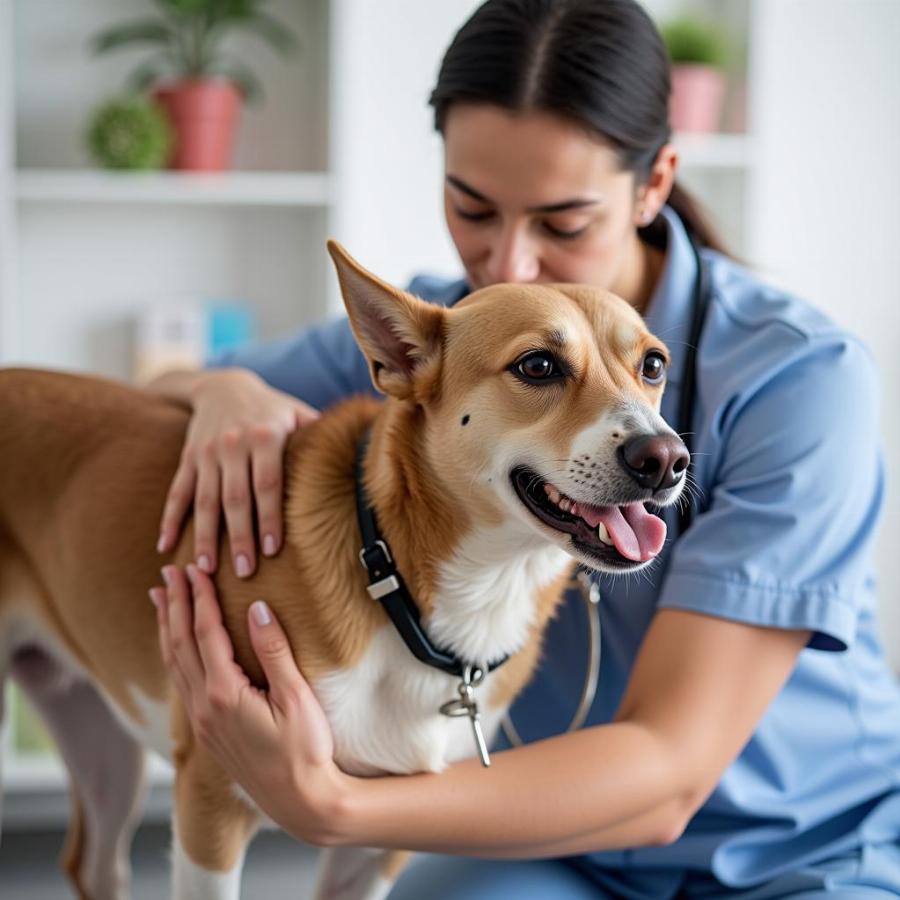Lupus in dogs, specifically Systemic Lupus Erythematosus (SLE), is a complex autoimmune disease where the body’s immune system mistakenly attacks its own healthy tissues and organs. This can lead to a wide range of symptoms, making diagnosis challenging and often requiring a combination of tests and careful observation. Recognizing the potential signs of lupus in your canine companion is crucial for early intervention and management. Understanding lupus symptoms is the first step towards ensuring your dog receives the appropriate care and support.
Recognizing the subtle and often varied symptoms of lupus in dogs can be challenging. This autoimmune disease can manifest in numerous ways, affecting different organs and systems within the body. From skin issues to joint pain and lethargy, the signs can be easily mistaken for other conditions. This guide will delve into the common, less common, and even rare symptoms of canine lupus, equipping you with the knowledge to seek veterinary attention promptly and potentially improve your furry friend’s quality of life. Let’s explore the complexities of lupus symptoms in dogs and empower you to be their best advocate.
Common Lupus Symptoms in Dogs
Some of the most frequently observed symptoms of lupus in dogs include skin problems. These can manifest as dle in dogs which often appears as crusty sores, redness, and hair loss, particularly on the face, ears, and nose. Joint pain and stiffness are also common, causing lameness and reluctance to exercise. Fever, lethargy, and loss of appetite can accompany these symptoms, painting a picture of general malaise.
Recognizing Skin Changes in Canine Lupus
Skin changes are often the first noticeable sign of lupus. Be vigilant for lesions, scaling, and ulcerations, particularly around the nose, ears, and footpads. These changes can be painful and may worsen with sun exposure.
Joint Pain and Mobility Issues
Lupus can cause significant joint inflammation, leading to pain, stiffness, and difficulty moving. Notice if your dog is limping, struggling to get up, or showing signs of discomfort during walks.
Less Common Lupus Symptoms in Dogs
While less frequent, other symptoms can provide further clues to a lupus diagnosis. These include swollen lymph nodes, muscle weakness, anemia, and kidney problems. These symptoms often require specific diagnostic tests to confirm their link to lupus.
Internal Organ Involvement in Lupus
Lupus can affect various internal organs, including the kidneys, liver, and lungs. Symptoms might include increased thirst and urination, jaundice, or difficulty breathing.
Neurological Signs Associated with Lupus
In some cases, lupus can impact the nervous system, leading to seizures, tremors, or behavioral changes. These neurological manifestations are less common but warrant immediate veterinary attention.
Rare Lupus Symptoms in Dogs
Rarely, lupus can cause more severe and specific symptoms, such as neurological disorders, including seizures and behavioral changes. Blood clotting disorders can also occur, leading to bruising or bleeding easily. These symptoms require specialized care and management.
Understanding the Severity of Rare Lupus Symptoms
While rare, these symptoms can be life-threatening and necessitate aggressive treatment. Early detection and prompt intervention are vital for managing these complex manifestations of lupus.
Diagnosing Lupus in Dogs
Diagnosing lupus requires a combination of physical examination, blood tests, and sometimes biopsies. There’s no single test for lupus, making the process often lengthy and requiring veterinary expertise.
Veterinary Tests for Lupus Diagnosis
Your veterinarian will likely perform a complete blood count, biochemistry profile, and urinalysis to assess organ function and look for indicators of lupus. Specialized tests, such as antinuclear antibody (ANA) tests, can further support the diagnosis.
 Veterinarian Examining a Dog for Lupus
Veterinarian Examining a Dog for Lupus
Frequently Asked Questions About Lupus Symptoms in Dogs
What are the first signs of lupus in a dog? Skin changes, like lesions and hair loss, often appear first, along with joint pain and lethargy.
Can lupus in dogs be cured? No, lupus is a chronic disease, but it can be managed with appropriate medication and lifestyle adjustments.
What is the life expectancy of a dog with lupus? With proper treatment, dogs with lupus can live relatively normal lifespans, although regular monitoring and medication are essential.
Is lupus painful for dogs? Yes, lupus can cause pain, especially in the joints and affected skin areas. Managing pain is a crucial part of treatment.
What should I feed a dog with lupus? A balanced, high-quality diet is important. Your veterinarian may recommend specific dietary changes based on your dog’s individual needs.
Are certain breeds more prone to lupus? While lupus can affect any breed, some breeds, like German Shepherds, Collies, and Poodles, seem to be slightly more predisposed.
What triggers lupus flares in dogs? Stress, infections, and sun exposure can trigger lupus flares. Minimizing these triggers can help manage the disease.
Further Questions and Resources
If you suspect your dog may be experiencing lupus in dogs nose or showing other concerning signs, please consult your veterinarian immediately. For information on other skin conditions that may resemble lupus, such as canine erythema multiforme in dogs, or treatment options like tacrolimus for dogs, explore our other articles. Early diagnosis and intervention are crucial for managing lupus and ensuring your furry friend’s well-being.
Conclusion
Understanding lupus symptoms in dogs is crucial for early diagnosis and effective management. While the varied and sometimes subtle nature of the symptoms can make recognition challenging, being aware of the potential signs and seeking prompt veterinary attention can significantly improve a dog’s quality of life. Regular monitoring, medication, and a supportive environment are key to helping dogs with lupus live comfortably.
Beaut Dogs is your trusted source for comprehensive and reliable information on all aspects of dog ownership, including breed-specific care, health, nutrition, and training. For personalized guidance and answers to your specific questions about canine lupus or any other dog-related concerns, please don’t hesitate to contact us at [email protected]. Beaut Dogs, your companion in the wonderful world of canine companions. Visit us at https://beautdogs.com for more valuable resources and insights.